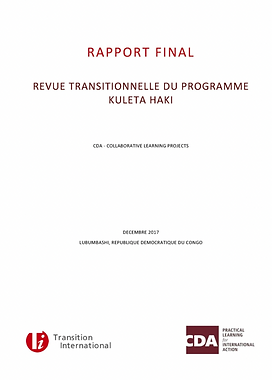
CORRUPTION AS A SYSTEM
Integrating Systems Analysis into Anti-Corruption Programming
OUR APPROACH
Besa Global's Corruption as a System Project offers Project offers technical assistance to implementers and donors as they integrate corruption analysis into their program development or evaluation processes.
This methodology is derived from causal loop mapping, as it more accurately reflects systemic dynamics of corruption in these contexts.
Our approach was tested through original research in the criminal justice sectors in the Central African Republic, Uganda, and the Democratic Republic of the Congo. It ultimately creates actionable analyses that enable policymakers and practitioners to identify leverage points, develop strategic collaborations, test theories of change, and avoid unintentional harm.
OUR COLLABORATIONS

CJL is happy to be part of the IACA collective action and corruption certificate. We are teaching systems thinking, stakeholder analysis and their translation to theories of change; all tailored to a collective action approach applicable to contexts of endemic corruption. The certificate is comprised of two modules and participants are expected to implement a one-year project to complete the certificate.
The modules cover fundamentals of anti-corruption studies, collective action theory, the role of collaboration in anti-corruption, corruption analysis, project management methodology, and others. The certificate is intended for experienced anti-corruption practitioners who have institutional support to implement a collective action program.

In early 2015, CJL (when housed at CDA) partnered with RCN Justice & Démocratie to develop a detailed theory of change focusing on the interconnectedness of the corruption system in the DRC. This project theory, rather than addressing specific individual transactions (e.g., paying a bribe to traffic police) focused on better understanding relationships. In August 2015, the one-year anti-corruption pilot project was launched in Lubumbashi and titled “Kuleta Haki” in Swahili, meaning “Provide Justice.”
-
The way corruption acts as a system within the police and justice sector is described in A Systemic Analysis of Corruption in the Criminal Justice System in Lubumbashi, DRC.
-
Our blog post Designing Adaptive Programming – One Theory of Change summarizes the initial theory of change of the Kuleta Haki project, which has evolved further.
-
Keen to know if the program was working, we conducted an internal formative evaluation as described in Why is Our Anti-Corruption Program Working?.
-
Finding My Way Around the Corruption System with a Map: Mapping the Effects of an Intervention and Extending Systems Mapping to New Areas explains how we updated our analysis that drove this program.
-
A final review of the program Rapport Final: Revue Transitionnelle du Programme Kuleta Haki is available in French alongside a summary blog post in English.
-
A consolidated brief summary of the lessons learned can be found in our publication Collective Action Against Corruption in the Criminal Justice System.
Some of Our Endemic Corruption Shareables




























